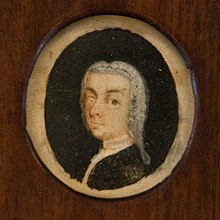Johann Adolf Scheibe
| Johann Scheibe | |
|---|---|

Johann Adolph Scheibe.
|
|
| Born |
5 May 1708 Leipzig |
| Died |
22 April 1776 (aged 67) Copenhagen |
| Other names | Johann Adolf Scheibe. |
| Occupation | Danish composer |
Johann Adolph Scheibe (5 May 1708 – 22 April 1776) was a German-Danish composer and significant critic and theorist of music.
Johann Adolf Scheibe was born in Leipzig as the son of Johann Scheibe (c. 1675 – 1748), an organ builder, and started keyboard lessons at the age of six. In 1725, he began studying law and philosophy at Leipzig University, and in the course of his studies he encountered the professor of rhetoric and poetry Johann Christoph Gottsched, whose aesthetic theories deeply influenced Scheibe. Gottsched's writings, which were primarily targeted toward the reform of German poetry and drama, greatly informed Scheibe's formulation of his philosophy of music.
Due to financial difficulties, Scheibe was unable to finish his university studies, and devoted himself instead to a largely self-taught career in music. In 1729 he applied unsuccessfully for the post of organist at St. Thomas Church, Leipzig, where Johann Sebastian Bach was the cantor. Scheibe was active in the musical scene of Leipzig until 1735.
In 1736, he moved to Hamburg where he made influential friends including Johann Mattheson and Georg Philipp Telemann. Encouraged by both, Scheibe published the magazine "Der Critische Musikus" between 1737 and 1740. The magazine received widespread attention and remains significant today for its discussion of significant contemporary composers.
In 1739, Margrave Friedrich Ernst of Brandenburg-Culmbach named Scheibe his kapellmeister. The next year, upon the invitation of the Margrave's sister, the Danish queen Sophie Magdalene, he became kapellmeister at the court of King Christian VI of Denmark. Scheibe rapidly became the most significant musical figure in Copenhagen. He led the royal orchestra, composed vocal and instrumental music, and was a driving force in the foundation of the first musical society, "Det Musikalske Societet", which held public concerts between 1744 and 1749.
...
Wikipedia
